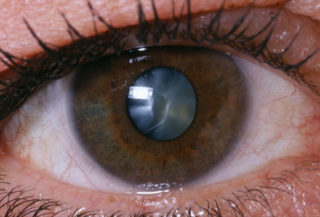CATARACTS
A cataract is a clouding of the lens of the eye that can make it harder for you to see. More than half of Americans age 65 and older have cataracts.
What Causes Cataracts?
Cataracts happen when protein builds up in the lens of your eye, making it cloudy. This prevents light from passing clearly through the lens, causing some loss of vision. New lens cells form on the outside of the lens, and the older cells are compacted into the center of the lens, forming the cataract.
Types of cataracts include:
- Age-related cataracts. These cataracts form because of of aging.
- Congenital cataracts. Babies are sometimes born with cataracts as a result of an infection, injury, or poor development before they were born, or they may develop during childhood.
- Secondary cataracts. These develop as a result of other medical conditions, like diabetes, or exposure to toxic substances, certain drugs (such as corticosteroids or diuretics), ultraviolet light, or radiation.
- Traumatic cataracts. These form after an injury to the eye.
Other things that can raise your risk of getting cataracts include cigarette smoke, air pollution, and heavy drinking.
Cataracts usually form slowly and cause few symptoms until they noticeably block light. Symptoms can include:
- Vision
that is cloudy, blurry, foggy, or filmy
-
Progressive nearsightedness in older people often called “second sight” because although their distance vision is getting worse, they may no longer need reading glasses
-
Changes in the way you see color
-
Problems driving at night such as glare from oncoming headlights
-
Problems with glare during the day
-
Double vision
-
Sudden changes in your glasses prescription

